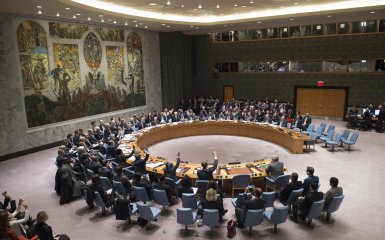Russia has vetoed the draft resolution of the UN Security Council against the proliferation of weapons, including nuclear weapons, in outer space.
Russia opposed the ban on nuclear weapons in space
13 of 15 Security Council members voted for the document submitted by Japan and the United States (USA, Great Britain, France, Algeria, Guyana, Ecuador, Mozambique, Sierra Leone, Malta, Republic of Korea, Slovenia, Switzerland, Japan). Only Russia spoke against it; China abstained.
According to the draft resolution, "all states, especially those with significant space potential, should actively contribute to the achievement of the goal of the peaceful use of outer space and the prevention of weapons pursuit in outer space."
As Linda Thomas-Greenfield, US ambassador to the UN, noted at the Security Council meeting, Russia's vote against the draft document may indicate that Moscow is hiding something.
If you stand by the rules, why not support a resolution that upholds them? — she asked the representatives of the Russian delegation rhetorically. — What can you hide?
Thomas-Greenfield states, "China has demonstrated that it would rather defend Russia as its junior partner than the global non-proliferation regime."
Kнslytsia's direct speech: The criminal Moscow regime did not allow the UN Security Council to adopt a draft resolution calling on all states to prevent the pursuit of weapons, including nuclear weapons, in space. This happened also because war criminals are still allowed to occupy the seat of the USSR as a permanent member of the UN Security Council, despite the daily crimes committed by Moscow.
What is known about Russia's placement of nuclear weapons in space
On February 14, the chairman of the House of Representatives Intelligence Committee, Mike Turner, declared a severe threat to the national security of the United States because, according to intelligence, Russia plans to place nuclear weapons in space.
US President National Security Adviser Jake Sullivan confirmed this information, and President Joe Biden instructed his administration to negotiate with Russia on the issue of a possible test of nuclear weapons in space.
According to CNN sources familiar with US intelligence, Russia is trying to develop nuclear space weapons that could destroy satellites.
Such a weapon could create a huge energy wave when detonated, potentially destroying the vast majority of commercial and government satellites on which mobile communications, bill payments and Internet use depend.
Experts say such a weapon could have the potential to destroy mega arrays of small satellites, such as SpaceX's Starlink, which was successfully used by Ukraine in its war with Russia.




